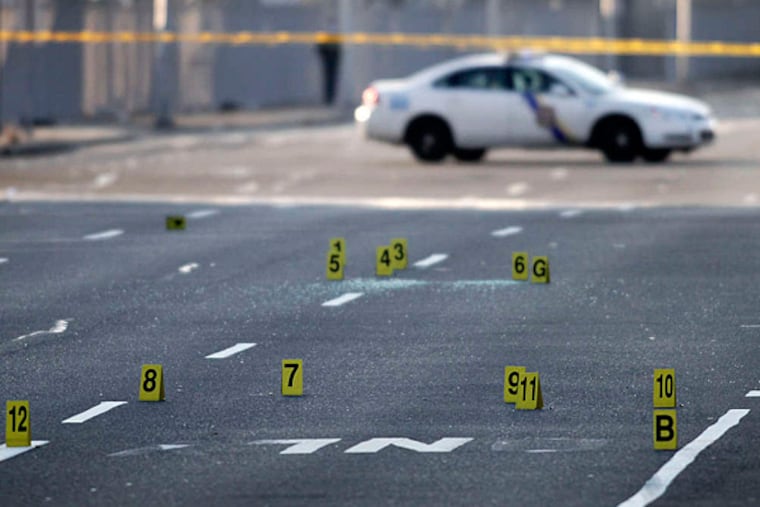
PHILADELPHIA is turning the corner on crime.
The latest statistics show sharp decreases in almost every major offense, led by homicide, which is down 30 percent this year compared to the same period in 2012.
It does not end there. The city has seen double-digit decreases in other major crimes, including robbery and auto theft, and smaller but significant declines in such crimes as aggravated assault and burglary.
At the beginning of July, of the 14 types of major crimes that police track on a weekly basis, nine were at their lowest levels in the last five years.
In looking for the reasons why, experts point to a number of trends. For starters, Philadelphia is riding a tide - crime is down in many big cities, not only in the U.S., but also overseas. And there are broad demographic trends at work, including fewer people in the crime-prone ages of 18 to 29.
Law-enforcement officials look at these numbers and see an additional cause: Smarter policing that is data-driven, proactive and community-centered. It is policing that relies on the best of the new, such as computer analysis that hones in on "hot spots," with the best of the old, including a revival of foot patrols.
Kevin Bethel has lived through the changes in policing. He graduated from the Police Academy in 1986. Today, he is deputy commissioner in charge of the department's patrol operations.
"When I came on, you were given a nightstick and handcuffs and a slapjack and told to go out and police," he told me. "Today that has changed substantially . . . the paradigm has shifted."
To hear a police official use the word paradigm is, in itself, a paradigm shift.
The old world of policing relied mostly on gut. Now it is being informed by academic research - albeit practical, result-oriented research - which tests crime-fighting approaches with scientific rigor.
The local epicenter for this approach is Temple University's Center for Security and Crime Science, headed by Jerry Ratcliffe, a former police officer in his native England who turned to academia after a climbing injury ruled out a future in the police.
Ratcliffe arrived in Philadelphia in 2003 and has been working with increasing frequency with the Police Department, particularly under Commissioner Charles Ramsey.
A turning point came in 2009, when Ramsey approved a summerlong experiment that centered on the efficacy of foot patrols.
Foot patrols were once the norm in policing. Gradually, they had been abandoned in favor of patrol by car. The assumption was that while foot patrols might make local residents feel better about the police and reduce their fear of crime, they had little or no effect on crime itself.
The Foot Patrol Experiment proved that assumption wrong. In the areas where foot patrols were used in 2009, violent crime went down by 23 percent.
Ramsey and top police officials embraced those findings, and foot patrols have become an important part of policing strategy.
Success, though, was built on more than a revival of police officers on foot. What the country is seeing today is the end result of a 20-year process that has changed policing. In Philadelphia, it began in the 1990s with Compstat, the data-based approach to fighting crime. It included more emphasis on community policing to break down the "us vs. them" thinking that permeated both the community and police. It also embraced the "broken window" theory of crime prevention that calls for police to pay more attention to quality-of-life crimes.
Today, the data and maps rendered by Compstat in the 1990s look crude compared to the astonishing array of deep, real-time data that can be called up on police laptops. (As part of the shift, a number of districts now have police officers assigned to work full-time as data analysts.)
It helps that police leadership today, many of them now in their 40s or 50s, are members of a generation that grew up with - and grew comfortable with - these new approaches. They believe these approaches work.
One of those believers is Joe Bologna, a cop since 1990 and now commanding officer of West Philadelphia's 19th Police District. An energetic man who exudes an enthusiastic can-do attitude, Bologna became captain of the 19th in June 2012 after serving a stint as head of the department's South Street police unit.
Bologna has a large map of the 19th in his office, stuck with multicolor pins, indicating the location of crimes he wants his officers to focus on. He assembled the map using two years of crime data - yellow pins for burglary, red for robbery, etc. - and deploys a half-dozen foot patrols, mostly on weekends, in these key areas.
"I want boots on the street, out of the metal box [a patrol car] and into the community," he said.
He preaches the gospel of community engagement and encourages his officers to concentrate on figuring out what can be done before they employ the enforcement option.
"I preach to the troops: 'Work on the little stuff and maybe we'll stop the big stuff from happening.' "